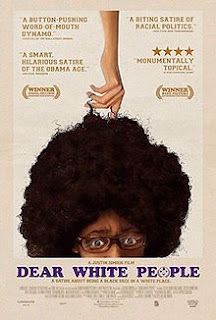Dear White People
Some people think we in the U.S. live in a "post-racial" society. After all, we have a black president. But as recent events concerning police brutality and the Confederate battle flag point out, we as Americans have a long way to go before racial prejudice and insensitivity are gone.
Dear White People, the debut film by Justin Siemen, is an intriguing and conversation-inducing film about students and administration at a fictional college, Winchester University, which is a prestigious but historically white college. Two percent of the student body is black, and a few are very vocal, notably Sam White (Tessa Thompson), who has a radio show called "Dear White People," in which she addresses what she finds to be the subtle indignities that whites inflict on blacks without even noticing it.
The other major characters are Troy (Brandon Bell), the son of the dean (Dennis Haysbert), who is pressured by his father to be a pillar of the community, and Kurt Fletcher (Kyle Gallner), the son of the university president, who heads the school humor magazine and is at frequent odds with the black students. Floating through without a side is Lionel Higgins (Tyler James Williams), gay, black, friendless, and sporting an Afro bigger than Oscar Gamble's.
Siemen, who also wrote, shows the complexity of race, especially in the hothouse environment of a college. Thompson, who is biracial, is in a relationship with a white guy. Some black students seem to be drawn to friendships with whites, perhaps envious of their status. Black students want a rule that assigns rooms randomly repealed, so they can have a dormitory of their own, a de facto self-segregation.
The climax of the film is when Kurt and his bodies throw a Halloween party that encourages those to release their "inner black," and so a lot of students attend in black-face or other insulting costumes. As the closing notes show, this is not a far-fetched idea, as several colleges have pulled this unadvised stunt over the last few years.
When I was in college, granted it was over thirty years ago, there was some of this. Black students tended to room together and eat together. They had the right to stay and eat anywhere they wanted, but chose not to. Just a few days ago Bernie Sanders, the most liberal candidate for president, had a rally disrupted by #blacklivesmatter, a worthy organization that seems to have trouble picking its targets.
No, we are not nearly post-racial. But I think sharp and clever and thoughtful films like Dear White People will help, in addition to being entertaining.
Dear White People, the debut film by Justin Siemen, is an intriguing and conversation-inducing film about students and administration at a fictional college, Winchester University, which is a prestigious but historically white college. Two percent of the student body is black, and a few are very vocal, notably Sam White (Tessa Thompson), who has a radio show called "Dear White People," in which she addresses what she finds to be the subtle indignities that whites inflict on blacks without even noticing it.
The other major characters are Troy (Brandon Bell), the son of the dean (Dennis Haysbert), who is pressured by his father to be a pillar of the community, and Kurt Fletcher (Kyle Gallner), the son of the university president, who heads the school humor magazine and is at frequent odds with the black students. Floating through without a side is Lionel Higgins (Tyler James Williams), gay, black, friendless, and sporting an Afro bigger than Oscar Gamble's.
Siemen, who also wrote, shows the complexity of race, especially in the hothouse environment of a college. Thompson, who is biracial, is in a relationship with a white guy. Some black students seem to be drawn to friendships with whites, perhaps envious of their status. Black students want a rule that assigns rooms randomly repealed, so they can have a dormitory of their own, a de facto self-segregation.
The climax of the film is when Kurt and his bodies throw a Halloween party that encourages those to release their "inner black," and so a lot of students attend in black-face or other insulting costumes. As the closing notes show, this is not a far-fetched idea, as several colleges have pulled this unadvised stunt over the last few years.
When I was in college, granted it was over thirty years ago, there was some of this. Black students tended to room together and eat together. They had the right to stay and eat anywhere they wanted, but chose not to. Just a few days ago Bernie Sanders, the most liberal candidate for president, had a rally disrupted by #blacklivesmatter, a worthy organization that seems to have trouble picking its targets.
No, we are not nearly post-racial. But I think sharp and clever and thoughtful films like Dear White People will help, in addition to being entertaining.



Comments
Post a Comment